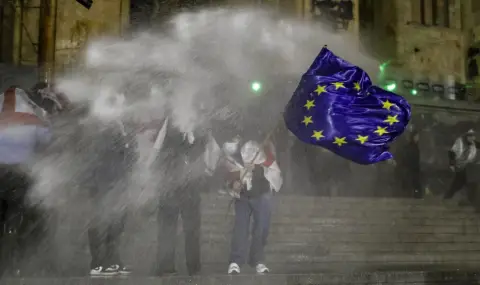Until the middle of last week, it seemed that the "Georgian Dream" party had gotten away with it after its disputed election victory on October 26 and that it would be able to govern for a fourth consecutive term without any problems.
At the end of October, the Central Election Commission data, according to which the party of businessman Bidzina Ivanishvili received an absolute majority of 89 seats in parliament, and the opposition only 61, caused outrage. The opposition's appeals, which were also joined by President Salome Zurabishvili, were initially followed by only a few thousand people, recalls the German public broadcaster ARD.
When "Georgian Dream" independently convened the deputies and appointed the new government - an action that was unconstitutional, only a few hundred people came out in front of the parliament building. It seemed that the forces of the protest movement had run out.
The game is over
However, then the ruling party around Ivanishvili took another step and the cup overflowed: Ivanishvili made Prime Minister Irakli Kobakhidze declare that the government would suspend EU membership negotiations by the end of 2028. Kobakhidze added that Georgia would nevertheless join the EU in 2030. But apparently people no longer believe his game: on the one hand, EU membership is stated as a goal - because polls have shown for years that the majority supports it, but at the same time, the corresponding steps are not being taken, especially those that would allow for a fair distribution of power in the country. Immediately after Kobakhidze's words, people took to the streets. And they are becoming more and more - in front of the parliament in Tbilisi and throughout the country, writes ARD.
Following the example of Putin and Orban
The calls for resignation during the protests are reminiscent of the mass demonstrations in 2012, when so much dissatisfaction had accumulated against then-President Mikheil Saakashvili that billionaire Ivanishvili, with his resources, managed to build a party and effect a change in power. Since then, "Georgian Dream" has consistently led in polls and elections against the divided and somewhat discredited opposition. At the same time, the ruling party is behaving increasingly authoritarianly, as if Putin and Orban are its role models, ARD points out.
The government has consistently dispersed the protests with violence, while the demonstrators, in turn, are arming themselves with ski goggles, raincoats and masks against tear gas and water cannons. And on Sunday night, demonstrators waved European flags and sang the national anthem late into the night in the capital Tbilisi and other cities. They were dispersed with water cannons and tear gas by police, some of whom fired projectiles and batons.
What scenario will things develop under?
People are asking themselves the worrying question of how things will develop: will the government crush the resistance and put the opposition in prison, as Lukashenko did in Belarus in 2021? Will the protests continue for weeks and destabilize the country, as happened on the Maidan in Ukraine in 2013, and will Russia be able to use the circumstances to intervene? Or can the population manage to carry out a peaceful transition of power, as in Armenia in 2018, when law enforcement officers no longer had a useful move against the protesting masses?
Civil disobedience
Meanwhile, hundreds of civil servants are distancing themselves from the government, writes the German public-law media. This process began with a declaration by diplomats and the resignations of ambassadors, referring to the Constitution, which enshrines "Euro-Atlantic integration".
Employees of the Defense Ministry also stated that they would act in accordance with the Constitution - this was perceived as an indication on their part that they were not ready to confront their own population, ARD points out. They were joined by judges, other employees in the administration, the Central Bank, as well as in companies, universities and media close to the government. President Zurabishvili has described the protests as a "strong movement of civil disobedience".
President challenges government
Zourabichvili is trying to coordinate the resistance. She has announced that she will remain in office after her term ends on December 14th – until a legitimate parliament is formed to appoint a government and elect a new president.
Zourabichvili and the opposition constantly appeal for support from the EU and the US, which are considered to be showing excessive restraint, while those close to the ruling media and the heads of the Russian secret services claim that this is a "Maidan" organized by the West. The US State Department has terminated the strategic partnership with Georgia, which was mainly of symbolic importance, ARD reports. And the new EU foreign policy chief Kaia Kallas announced "direct consequences".
Ivanishvili endangers the country
If until now the opposition was not a reliable alternative for the majority of Georgians, it is now becoming obvious that Ivanishvili is pushing the country towards an ever deeper crisis, ARD writes. Ivanishvili is convinced that he can only protect his own security by staying in power no matter what, says his former aide Giorgi Gakharia, who now heads an opposition party. While he was a businessman in Russia in the 1990s, Ivanishvili learned how dangerous Vladimir Putin was. But instead of ensuring stability in his country, he is making it increasingly vulnerable to Russian influence.
Author: Silvia Stöber (ARD)
